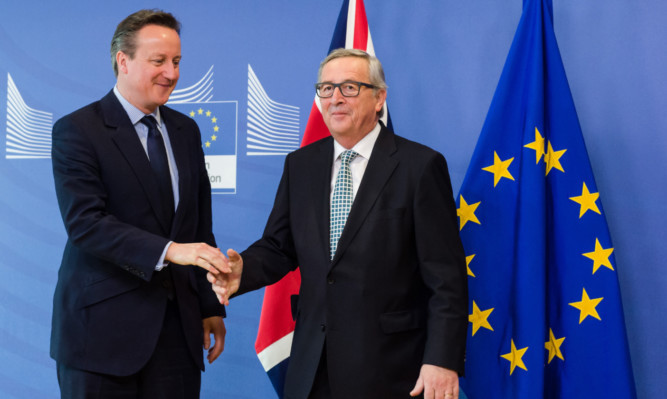If you are going to host a feast, then don’t serve crumbs. We have a referendum on Europe a subject so marvellous, corrupt and necessary it should offer an orgy of ideas.
Instead, we get a vote on whether child benefit claimants from the Czech Republic should be allowed to send the funds home.
It’s an insult to crumbs.
We may come to see the 2014 referendum as an accidental negotiating device for more home rule within the UK but at least it had ambition.
The 2016 referendum on our membership of the EU has no vision and little cunning.
This is a great pity as the European Union is one of the world’s great projects up there with space exploration and the fight against cancer.
Europe has been the bloodiest continent in global history. For a thousand years we have killed and tortured in the name of religions, land and megalomania.
We think we did this until 1945 and then got sensible but that’s wrong.
In the 1990s we allowed a mini-reenactment of the Second World War to occur in the Balkans: ethnic massacres and concentration camps provided as if to remind ourselves of our brutality.
Perhaps this is just history’s dice we had the wealth and the population to cause havoc. Yet there is something specifically European about this it is our problem to solve.
So the move to bring unity within Europe in order to eliminate provocation and improve communication is a great thing.
We downplay political invention too easily because there is nothing to touch or buy, we don’t know how to value institutions.
Given we presume “those in charge” are inept, political inventions are perpetually not good enough which is a healthy attitude in a democracy but not the whole story.
The idea of the European Union is beautiful. Like the United Nations, it speaks of our humility and hope. And like the UN, it desperately needs repair.
The most obvious is the legacy of the Balkans war, echoes of which can be found in the refugee crisis from the Syrian war. Europe presents itself as a union but behaves as a collection of individuals.
The EU’s inability to intervene in the Balkans earlier, or to develop a coherent response, or to ultimately police its borders with anything like necessary competence, was a stain on all Europeans. We failed our own and betrayed our history.
Muslims, in particular, felt they were let down by a Christian Europe and that contributed to the fanatics’ war of today. Despite talk of learning lessons, the bickering and chaos over what to do with a displaced people seeking refuge in Europe shows the EU still fails the test of competence.
Yet it’s war and refugees and crimes against humanity which should be Europe’s strong point it’s why the EU was set up in the first place.
Our referendum should be, in part, about how the EU becomes a functioning global unit a thing which protects its citizens, contributes successfully to wider crises and projects a sense of dependability in an unstable world.
If that weren’t enough to keep ourselves busy in the run-up to the vote, we could debate the evident financial and bureaucratic inefficiencies of the EU. You don’t build citizens’ trust by rejecting serious scrutiny of budgets.
Trust is hard to win given the structural quirks of the EU too a parliament sharing legislative duties with the Council of the European Union, both junior to the European Commission, led by a president you and I weren’t allowed to vote for. If the referendum isn’t about the EU’s failure to act externally, then lets make it about its evident need to reform internally.
Europe needs be to able to act faster, with greater unity while also being more accountable to the people.
Not enough yet for our feast of ideas about how improve this great invention? Then let’s examine the Euro cock-up a currency with multi-dimensional debt obligations, a catastrophe waiting to happen.
If the SNP do plan to hold another independence referendum should England vote for Brexit, then Scotland will be joining the Euro. Now might be a good time to discuss that.
Here is feast which requires ambition, a spread which demands a vigorous and hopeful Yes to Membership campaign.
Staying in should be about the moral purpose of Europeans.
Are we still vigilant to our own weaknesses, still driven by a higher vision than national gain?
Does a child drowning in the Aegean Sea speak to our better intentions or to our fears? Are we still proud owners of a great human invention or arrogantly selfish in our politics?
This is the referendum campaign we should be having, these the questions we should ask.
Of course the EU is broken and corrupt but it is profoundly necessary. Do we help make it better or walk away? When we got a Prime Minister who wanted to vote on the matter, he was looking over his shoulder, not to our future.
There is more than crummy politicians at stake.
